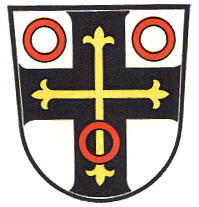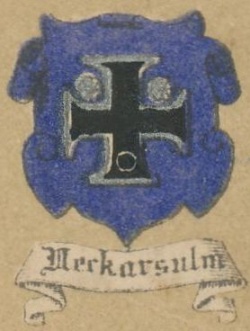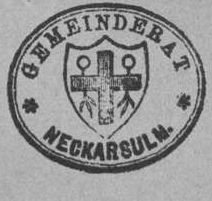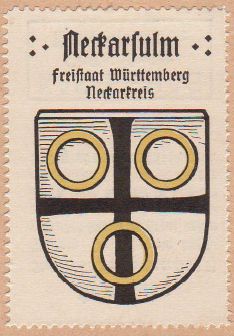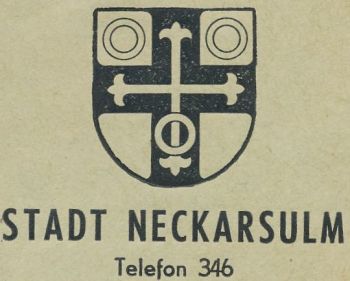Neckarsulm: Difference between revisions
Knorrepoes (talk | contribs) m (Text replacement - "{{de}}" to "") |
Knorrepoes (talk | contribs) m (Text replacement - "|'''English''' ↵| {{blazon wanted}}↵" to "|'''English''' | blazon wanted ") |
||
| Line 17: | Line 17: | ||
|- | |- | ||
|'''English''' | |'''English''' | ||
| | | blazon wanted | ||
|} | |} | ||
Revision as of 11:15, 7 April 2023
NECKARSULM
State : Baden-Württemberg
District (Kreis) : Heilbronn
Additions : 1971 Dahenfeld; 1972 Obereisesheim
| German |
In Silber ein durchgehendes schwarzes Deutschordenskreuz, belegt mit einem goldenen Lilienkreuz, das Ordenskreuz oben begleitet von zwei roten Ringen, das Lilienkreuz unten beheftet mit einem roten Ring. |
| English | blazon wanted |
Origin/meaning
Neckarsulm was a part of the State of Mainz until 1484. The oldest seal dates from the early 14th century and thus shows the wheel of the State of Mainz. In 1484 the city was acquired by the Teutonic Order and shortly after the seals showed the cross and rings. The black cross is the symbol of the Teutonic Knights, the rings are derived from the arms of the Knight Rheinhard von Neipperg. During the centuries the rings were often shown as roses. Finally in 1955 the historical arms were officially granted, with the addition of the small cross, which was part of the great arms of the Order.
| The arms on an 1877 poster |
The municipal stamp shown in 1892 |
| The arms by Hupp in the Kaffee Hag albums +/- 1925 |
Municipal stationery, 1960s |
Literature: Stadler, 1964-1971, 8 volumes.
